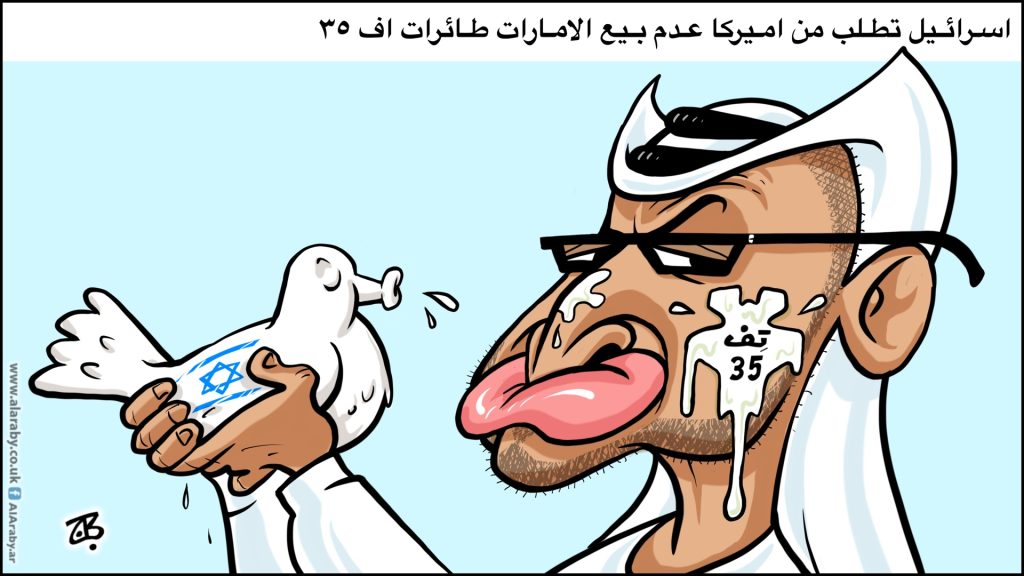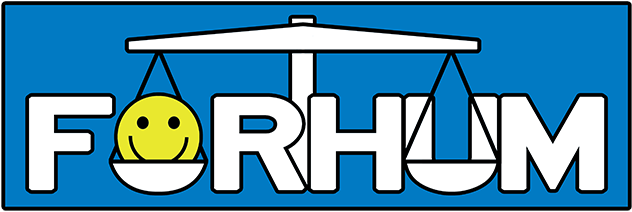
Mode of expression: Cartoon
Publication: Al-Araby
Region: Jordan
Relevant dates: 26 August 2020 – 23 December 2020
Outcome: All charges dropped
Judicial body: Public Prosecution Office
Type of law: Criminal law
Themes: Security/defamation/diplomacy
Context and legal case
On 26 August 2020, Jordanian cartoonist Emad Hajjaj published a cartoon in Al-Araby, a London-based pan-Arab news outlet with a website and daily newspaper, which criticized a deal between the United Arab Emirates and Israel and mocked Emirati Prince Mohammed Bin Zayed. The image depicts an Israeli flag-daubed dove spitting in the face of a man in an Emirati Ghutra many believe represents the UAE’s de-facto leader, bin Zayed. A splatter on his cheek forms the shape of a fighter jet with Arabic letters inside spelling out F-35—a reference to the military hardware Israel has lobbied the U.S. against selling to the UAE.
The same day of the cartoon’s publication, a police patrol arrested Hajjaj on the Jordan Valley road while the cartoonist was on his way to Amman, the capital, and transferred him to the police headquarters in downtown Amman. A day later, the authorities brought Hajjaj to the public prosecutor’s office, where he was charged with “disturbing relations with a sister country” under the country’s counter-terrorism law. The public prosecutor’s office ordered Hajjaj to be detained for 14 days and transferred him to Salt Prison, northwest of Amman.
On 30 August 2020, Hajjaj was released from prison. The State Security Court, specialized among other things in dealing with high treason and terrorism cases, considered itself incompetent to handle the case and released the cartoonist on bail. His file was handed over to the General Prosecutor of Amman and the charges against him were also requalified to “slander and libel.”
On 23 December 2020, The Criminal Magistrate’s Court of Amman decided to drop charges against the cartoonist for “contempt of a president of a foreign country against the provisions of 122/1 of the Penal Code.”
Analysis
Although this legal case had a favorable outcome for the cartoonist, it highlights the risks for a political satirist working in a context where the red lines of censorship are not clearly defined and prone to shifting. At 53 (in 2020), Hajjaj can be considered a seasoned cartoonist. His cartoons were involved in court cases in Jordan a number of times, giving him ample experience to gauge whether a cartoon risked crossing a line or not. In this case, however, he was taken by surprise. “I thought that I understood the game,” he told TIME magazine a couple of days after his release. “It was shocking, very confusing for my family. It was a difficult moment standing in line to enter the jail with criminals and drug dealers.” The case shows that, without solid legal protection (for example, anchored in a constitution), freedom of expression and political satire very much depend on shifting political contexts. In the case of Jordan, that context has included a deterioration of press freedom and Jordan’s national interest in preserving good relations with the UAE, a growing power in the region.
Sources and further reading:
Cartooning for Peace – Alert Jordan https://www.cartooningforpeace.org/en/soutiens/alert-jordan-emad-hajjaj/
Cartooning for Peace – Alert Jordan https://www.cartooningforpeace.org/en/alert-jordan-emad-hajjaj/
The story of cartoonist Zunar https://www.zunar.my/2016/10/23/story-cartoonist-zunar/
Malaysia’s Najib guilty of all charges in 1MDB-linked graft case https://www.aljazeera.com/news/2020/7/28/malaysias-najib-guilty-of-all-charges-in-1mdb-linked-graft-case
